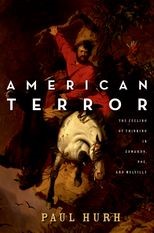American Terror: The Feeling of Thinking in Edwards, Poe, and Melville
American Terror: The Feeling of Thinking in Edwards, Poe, and Melville
Cite
Abstract
American Terror interrogates the origins, contexts, and significance of the distinctive tone of terror within a major strain of early and nineteenth-century American literature. Contrary to critical tendencies to literary terror as a rejection or contrary reaction to Enlightenment thought, this book draws upon new work in affect theory and the refreshed interest in American intellectual history to argue that American authors sought through it to produce the peculiar affect of scientific objectivity: the feeling of thinking. As what counts as knowledge comes to be aligned with a set of abstract universal rules and processes—the scientific method, propositional logic, geometric models of analysis—literary terror does not reject such progress as unfeeling, but rather sets out to describe it in feeling. Employing close reading in concert with original historical research, this book threads the story of terror’s relation to philosophy through three American writers who not only write terror, but write about terror. It begins with Jonathan Edwards’s theoretical defense of terror as a sensation of truth, develops through Edgar Allan Poe’s refinement of terror’s sensation of truth within an aesthetics of analytical methodology, and culminates in Herman Melville’s dramatization of the consequences exacted by this terrific perspective: a radically unknowable universe that everywhere refuses to relax its demands to be known. Through this critical repositioning of literary terror, American Terror charts how the dark strain of American literature carves a previously unaccounted for affective curve in the route of philosophy from Enlightenment idealism to poststructuralism.
-
Front Matter
-
Introduction: Reopening Darkness
-
1
Awakening Terror: Hellfire Preaching, Jonathan Edwards, and the Logic of Revivalist Affect
-
2
Critical Terrors: Poe’s Aesthetic Terror and the Claims of Art after Jena
-
3
The Air of Analysis: Resolution and Composition in Poe’s Sublime and Confessional Tales
-
4
The Uneven Balance: Dialectical Terror in Moby-Dick
-
5
Dread: Space, Time, and Automata in The Piazza Tales
- Afterword: “Some Dim, Random Way”
-
End Matter
Sign in
Personal account
- Sign in with email/username & password
- Get email alerts
- Save searches
- Purchase content
- Activate your purchase/trial code
Institutional access
-
Sign in through your institution
- Sign in with a library card Sign in with username/password Recommend to your librarian
Institutional account management
Sign in as administratorPurchase
Our books are available by subscription or purchase to libraries and institutions.
Purchasing information| Month: | Total Views: |
|---|---|
| January 2023 | 1 |
| April 2023 | 3 |
| May 2023 | 1 |
| September 2023 | 3 |
| October 2023 | 1 |
| October 2023 | 1 |
| December 2023 | 1 |
| February 2024 | 4 |
| February 2024 | 1 |
| March 2024 | 1 |
| March 2024 | 1 |



Get help with access
Institutional access
Access to content on Oxford Academic is often provided through institutional subscriptions and purchases. If you are a member of an institution with an active account, you may be able to access content in one of the following ways:
IP based access
Typically, access is provided across an institutional network to a range of IP addresses. This authentication occurs automatically, and it is not possible to sign out of an IP authenticated account.
Sign in through your institution
Choose this option to get remote access when outside your institution. Shibboleth/Open Athens technology is used to provide single sign-on between your institution’s website and Oxford Academic.
If your institution is not listed or you cannot sign in to your institution’s website, please contact your librarian or administrator.
Sign in with a library card
Enter your library card number to sign in. If you cannot sign in, please contact your librarian.
Society Members
Society member access to a journal is achieved in one of the following ways:
Sign in through society site
Many societies offer single sign-on between the society website and Oxford Academic. If you see ‘Sign in through society site’ in the sign in pane within a journal:
If you do not have a society account or have forgotten your username or password, please contact your society.
Sign in using a personal account
Some societies use Oxford Academic personal accounts to provide access to their members. See below.
Personal account
A personal account can be used to get email alerts, save searches, purchase content, and activate subscriptions.
Some societies use Oxford Academic personal accounts to provide access to their members.
Viewing your signed in accounts
Click the account icon in the top right to:
Signed in but can't access content
Oxford Academic is home to a wide variety of products. The institutional subscription may not cover the content that you are trying to access. If you believe you should have access to that content, please contact your librarian.
Institutional account management
For librarians and administrators, your personal account also provides access to institutional account management. Here you will find options to view and activate subscriptions, manage institutional settings and access options, access usage statistics, and more.